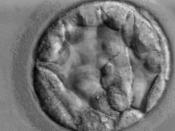From a moral and usually religious point of view, controlling human reproduction is seen as a deviation from procreation. Yet an extraction from Henry Leese's "ÃÂHuman Reproduction and In Vitro Fertilisation' quotes from article 12 of The European Convention on Human Rights that "Men and women of a marriageable age have the right to marry and found a family"�. If some defect in either the man or woman causes them to be infertile and therefore prevents them from founding a family why can't IVF for example be an acceptable procedure? When thought of in this way it does seem acceptable but to what extents should human reproduction be subject to intervention? Concentrating mainly on In Vitro Fertilisation, I wish to present arguments for and against this "ÃÂinterference' in human reproduction.
IVF is a medical procedure in which mature eggs, oocytes, are collected from the ovary of a woman, then fertilised with male sperm from the partner or from a donor, outside the body.
Finally transferring one or more of the fertilised eggs into the uterus of the same or another woman in the case of surrogacy, for normal gestation.
One of the advantages of IVF and reproductive technology is its influence on the problem of fertility. Couples unable to reproduce would think of themselves as failures or inadequate. "Infertility is indeed a distressing condition and an illness which needs to be treated"� (Henry Leese), if this is so, why the arguments against IVF and the control of human reproduction? Every couple has the right to have children and a fertility problem need not impede this. Hence, IVF has had a great effect on society as a whole.
Yet, the success rates for IVF are not high "the chances for a couple having a baby as a result...


